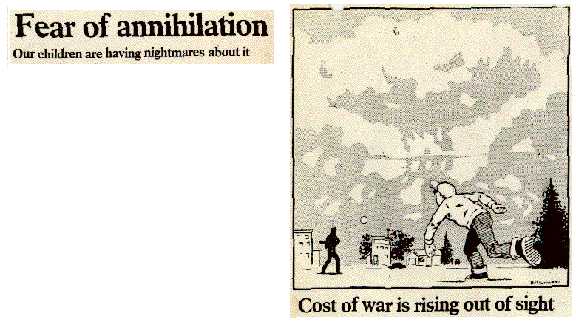

Canadian Press
NEW YORK--Another side of the arms race is being explored by analysts outside the U.S. military establishment--the prohibitive cost of waging a major conventional war.
They reason that if a nuclear war between the U.S. and the Soviet Union is unthinkable, then conventional war becomes a major possibility.
James Dunnigan, a professional at simulating wars, comes up with some startling figures about the cost of conventional war in his new book, How to Make War.
Dunnigan writes that one year of a major conventional war would cost the U.S. more than $1 trillion. Most of this money would be spent on so-called smart munitions--weapons that home in on their target.
Production would need to rise thirtyfold over a couple of years to make it possible, Dunnigan says.
His detailed figures on costs could mean the collapse of the U.S. and Soviet economies if a conventional war between the superpowers were prolonged.
By ANN GOAD
Fear of nuclear annihilation is creeping into our children's dreams.
Experts now list "The End of the World" among the top 10 concerns of the younger generation.
"There's a change in what children indicate they find most frightening," said Bob Worcester, a psychology instructor at Vancouver City College.
Children fear they won't live long enough to get a university degree, get married and have children of their own, Worcester said. They don't place much faith in the future of mankind--and they think about their world coming to a sudden and violent end.
"They dream about it and they tell us they are worried about not surviving into adulthood," said Worcester.
That adds a new and difficult twist to growing up, said Catriona Strang, 16, a Grade 12 student at Vancouver's Ideal School--an alternative high school.
"If you think about it, civilization has always had a past, a present and a future," she said. "But for our generation there may not be a future and it's really very difficult to deal with."
That doomsday belief is a factor in young people's overall emotional state, said Gary Mavis, director of Vancouver's Crisis Line, an emergency counselling service.
While most people call the Crisis Line over more immediate concerns such as unemployment, loneliness or family disputes, "It is the ground floor they're working from," said Mavis. "The nuclear bomb thing is there."
In fact, a recent survey of 2,000 American students--conducted by the Boston-based Educators for Social Responsibility--found 87 per cent felt there will be a nuclear war in the next decade. And of that group, 90 per cent were convinced that neither they nor their families will survive.
The belief that destruction would be absolute adds to the stress about nuclear war, said Mavis. "To lose a parent is scary enough--but (in a nuclear war) the whole family could disappear in one fell swoop."
The traditional sense of security young children feel about their parents' ability to protect them has been eroded by the threat of nuclear annihilation, said Dr. Dorothy Goresky, head of the Vancouver branch of Physicians for Nuclear Responsibility.
"Previous to the threat of nuclear war most kids grew up in a family where they felt the parent had control of the situation and that gave them a sense of security," Goresky said. "But now they have begun to get a sense that the adults don't have any control either."
"There is a growing sense of, 'What's the use of it all?'--of, 'If we're not going to be here tomorrow why plan for the future? We might as well live for today.'"
Living for today can have serious consequences for society, experts said. It can lead to a reduced respect for other people, and for people's private property. Lack of faith in tomorrow can also result in lack of preparation, a who-cares attitude about education and career planning.
Fear about the future gives children a growing sense of powerlessness, said Harvard medical school child psychologist Dr. John Mack at the conclusion of a 1978 study of 1,000 Boston-area elementary and high school students.
"There is cynicism, sadness, bitterness and a sense of helplessness. They feel unprotected. Some have doubts about planning families or are unable to think ahead in any long-term sense," he concluded.
How does this attitude affect young people's behavior?
"The possibility of a nuclear holocaust contributes to adolescent anxieties and may even contribute to their aimlessness and lack of planning for the future," said Worcester.
Richmond teacher Elsie Dean, a member of Teachers for Nuclear Responsibility, said many students are simply giving up, particularily in high schools.
"I would say there's a lot of fatalism among teenagers," she said. "They think they are doomed. It makes them more irresponsible in that they live for today. Their response to nuclear war is, 'Let's not work so hard.'"
But there is another response, said Dean: "There is a growing sense that they can do something to prevent nuclear war."
And taking action is the best medicine for concerned young people, said psychology instructor Worcester. "The best thing is to hold out the hope that they can initiate action that will make a difference."
Increasingly young people are taking action to protect their futures. In Vancouver, more than half a dozen high school disarmament groups have been formed in the past year.
"If the bomb is dropped, I'd rather go down fighting," said Farah Shroof, 18, a Grade 12 student who has formed a disarmament club at Prince of Wales senior secondary.
"I work with the belief that I can make a difference. I love my life the way it is and I
want to keep it."
(texts of May 8, 1983 The Province articles)